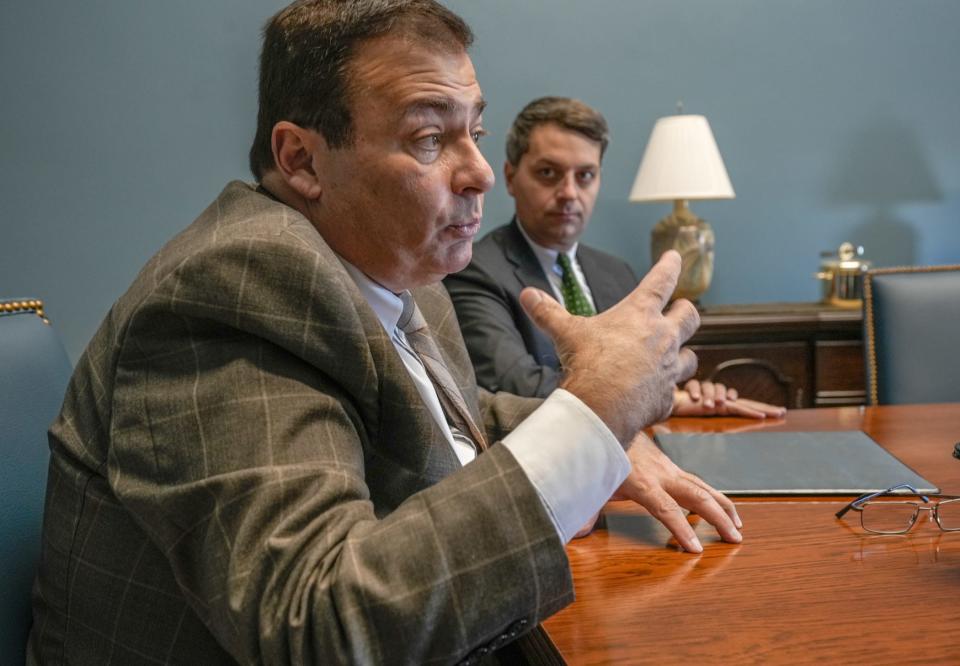Does more affordable housing threaten local control? RI House speaker defends his plan
House Speaker K. Joseph Shekarchi Thursday defended his plan to spur housing construction in Rhode Island against concerns it will erode local control of development.
Shekarchi wants to combat Rhode Island's worsening affordability crisis by making it easier to build homes and reverse the state's lowest-in-the-nation residential construction rate.
He unveiled a 14-bill package last week that would streamline the permitting process for subsidized housing, allow property owners to create accessory apartments for non-family members, convert commercial buildings into residences and build larger buildings near transit hubs. It would also ban charging prospective tenants application fees to rent an apartment.
Shekarchi has sought to reassure skittish local officials and homeowners that his housing package will not force communities to allow low-income housing or take away their authority to block development that doesn't make sense.
Familiar worries surface in legislative debut of housing package
But at the first hearing on the package Thursday night, those concerns bubbled up from lawmakers and local leaders.
West Warwick Republican Rep. Patricia Morgan objected to legislation that would prevent cities and towns from limiting the number of bedrooms in affordable-housing projects or requiring that new developments have more than one parking spot per home.

"In West Warwick we can have so many cars parked along the roads ... and you just don't want the roads just constantly cluttered with cars," Morgan said with Shekarchi at the witness table.
"The thought process behind the bill is you don't want a project denied for people who don't have cars," Shekarchi said. "A lot of these projects are designed for people in high density areas near transit that don't have cars or share cars."
Morgan: "I know you know what it looks like when there are too many cars in a neighborhood. It drives down the value."
Shekarchi: "Look, I'm a realist. If a municipality doesn't want a project, they are going to find a way to stop a project. I am trying to eliminate as many of those barriers as possible while still leaving local control. I want people to look at housing differently. I want people to understand just because someone is poor or needs affordable housing, they are not bad people."
In written testimony, Rhode Island Republican National Committeeman and Cranston Planning Commission member Steven Frias objected to measures in Shekarchi's housing package that would allow accessory apartments in single-family zones and permit developers to turn commercial properties into homes.
"This legislation overrides local zoning. Basically, it mandates certain permitted uses within commercially zoned properties and imposes this requirement on all commercial properties in all municipalities," Frias wrote about the commercial-to-residential conversion bill. "The conversion of commercially zoned property to residential property can make sense, but it may not make sense for all commercial properties all of the time."
House Speaker says local control sometimes has a downside
When it comes to turning old mills, shopping malls, hospitals and other commercial buildings into homes, Shekarchi said taking local control away could be a feature and not a bug.
"I absolutely want to take municipal control away in that situation," Shekarchi told the Journal after testifying. "Because this is a building that existed as a factory, that has high capacity sewer already in it, has high capacity water already in it, has in some cases dozens, if not hundreds, of people coming and going all day, deliveries, manufacturing trucks, noise and odors. So if a city or town has already approved that and it is already existing, tell me why we can't put in subsidized housing, elderly housing or housing in general."
Frias also objected to a bill that would prevent municipalities from denying a housing project based on a community's comprehensive plan if that plan has not been updated in more than a dozen years. Given the effort needed to update a comprehensive plan, he suggested municipalities get two years to come into compliance before the old plans can no longer be used to deny projects.
Shekarchi said he is open to such a grace period.
Who supports the legislation designed to increase RI housing stock?
As expected, the housing package has broad support from a wide range of charities, housing advocates, the real estate industry and low-income housing developers. The list of supportive groups includes the United Way, Housing Network of Rhode Island, One Neighborhood Builders, Rhode Island Association of Realtors and Rhode Island Builders Association. The accessory apartment bill is AARP's top legislative priority in the state.
Gov. Dan McKee, a former mayor and longtime defender of local control, on Thursday came out in support of eight of the nine bills in Shekarchi's housing package, including commercial conversions, accessory apartments and banning rental application fees. The one bill in the package McKee did not mention was the bill that would invalidate expired comprehensive plans.
"Housing is one of the most crucial issues facing Rhode Island and states across the nation," McKee wrote in a letter to lawmakers on the House Housing and Municipal Government Committee. "For too long, we have heard that the development process in Rhode Island is convoluted and lengthy. I and many others want to see increased production at all affordability levels..."
The Rhode Island League of Cities and Towns agrees with the housing package "conceptually" but is asking for changes to some of the bills, including exempting lots with no public water supply from the accessory apartment law and providing a two-year grace period for towns to update their comprehensive plans.
Jordan Day, associate director of the League, said 11 communities have out-of-date comprehensive plans.
Last year Rhode Island cities and towns approved building permits for 1,401 housing units, according to the U.S. Census Bureau, nine more than in 2021 but still the fewest in the nation.
This article originally appeared on The Providence Journal: Shekarchi defends affordable-housing bills; local control in spotlight

